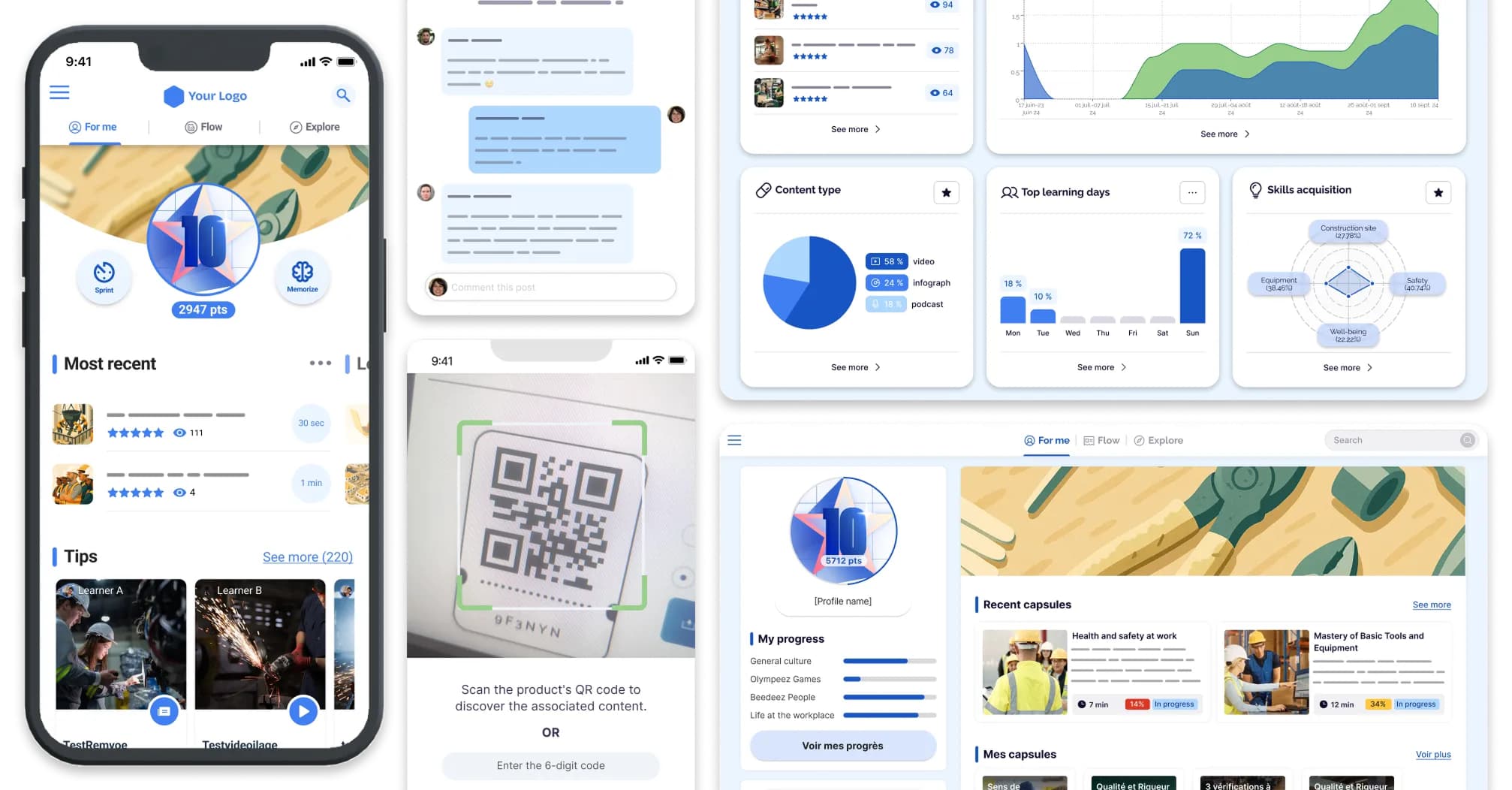Are you looking for an e-learning platform that will help you optimize the training of your employees? There are a lot of solutions out there. Flexible, modular, fun, dynamic, interactive, connected training solutions are constantly being developed and arouse great enthusiasm among learners. But it is a question of choosing the right provider to choose a quality teaching solution, which will not be a simple transposition of a face-to-face course, but a real experience for users with powerful tools and content.
How to give your employees the means to acquire targeted skills independently? The answer: by relying on an e-learning platform, which streamlines and personalizes learning as much as possible !
What is an e-learning platform?
First of all, let's define digital learning: it characterizes all the digital training and support tools put at the service of learners. But be careful, digital learning does not mean e-learning! E-learning refers to distance learning only. Digital learning includes both distance education and face-to-face training, as long as it involves one or more digital tools.
THEelearning is an online learning solution organized remotely on the web. Learners can access educational modules in the form of texts, videos, videos, animations, quizzes, content capsules, challenges, etc. and thus learn at their own pace when their agenda allows it. The user becomes proactive, an actor in his training ; he can do it at his own pace, go back to the training modules several times to solidify his knowledge, and interact with other people.
Companies, training organizations, independent trainers, you are looking for the best e-learning platform (or LMS platform) to successfully transform internal training? Whether it is distance or face-to-face learning, your choice will be decisive: your software must be adopted by both trainers and learners and correspond to your needs. Choosing the right e-learning platform is the cornerstone of an e-learning training process. How to choose it well? What are the best LMS platforms right now? What are the best tools for creating content? What experience for users?
How do you choose your e-learning platform?
Depending on your situation and needs, your requirements will vary. It is imperative to study the functionalities offered in each LMS solution. Knowing your target audience and the expected results will make your choice easier. For example, if you manage several dozen or even hundreds of collaborators, you will appreciate some features such as adding users en masse and you will consider a platform with robust user management tools and good reporting capabilities. Or, if you have many mobile employees, you will surely want a solution that can be used on tablets or smartphones.
Depending on your goals and the uses of your target audience, you can quickly define your priorities in order to refine your selection. Here are some of the must-have features: Evaluate learners by taking exams via quizzes, multiple choice questions, tests, etc. Communicate securely and collaboratively with collaborative messaging (chat), thematic forums, etc. It is also important to monitor learners' progress by analyzing the scores obtained in the evaluations; by managing the catalog of modules or by issuing a certification.
Other important questions need to be asked:
- How much is your budget?
- How many people, learners, and instructors will use your online learning solution?
- Do you want collaboration to be at the heart of the learning journey?
- What level of user experience do you want?
- How customizable should the e-learning platform, or LMS platform, be?
- What level of gamification?
- What customer service do you need?
The advantages of e-learning for employee training
E-learning and LMS platforms are constantly developing thanks to their numerous advantages:
Easy-to-access content
From registering to monitoring learners, including the distribution of training content, everything is faster and more fluid. A few clicks are enough to access its training. You move at your own pace, according to your schedule and your prior skills. In addition, the variety of teaching and teaching materials proposed is a guarantee of dynamism and therefore of commitment: learners are stimulated in multiple ways and are therefore less likely to drop out.
Reduced training costs
Another undeniable advantage of e-learning (or LMS) in business: its cost.
In fact, even if setting up an LMS represents an investment, the savings are numerous: no more classroom rentals, transport, accommodations and catering. In addition, the performances obtained are often higher thanks to the personalized and engaging content of e-learning, and this for an unlimited number of learners. In the event of the deployment of a new commercial offer, e-learning makes it possible to train all employees extremely quickly, on all continents !
Rapid development of employee skills
Thanks to this flexible and permanently available digital tool, each learner can learn at their own pace and assimilate new skills well. In addition, digital learning focuses on short content that is targeted at specific concepts, which makes it easier to remember them. The use of processes such as gamification (or gamification), which allowsintegrate game mechanisms in a serious learning context, is also an important added value: you learn much more effectively while having fun.
Better monitoring of in-company training
LMS platforms collect a lot of learner data, which makes it possible to know which e-learning modules have been consulted, but also to measure various indicators such as the completion rate, the attendance rate or the scores obtained. Thus, the company can monitor and analyze its online learning system in real time.
Data analysis from an e-learning platform
Another major advantage of an e-learning platform (or LMS platform) lies in the possibility it offers to collect a large amount of data that is automatically made available to the administrator in the form of infographics that are easy to read and analyze. This data makes it possible both to monitor the learners in an optimal manner, but also to measure the effectiveness of the training and, if necessary, to improve it. Finally, LMS also give the possibility of Centrally manage all the administrative (registrations, evaluations, etc.) and budgetary aspects of a training. Their field of action, therefore, is particularly broad.




